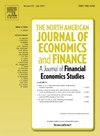Geopolitical risk and financial stress
IF 3.9
3区 经济学
Q1 BUSINESS, FINANCE
North American Journal of Economics and Finance
Pub Date : 2025-07-24
DOI:10.1016/j.najef.2025.102510
引用次数: 0
Abstract
This paper explores the relationship between geopolitical risk and financial stress. We use a quantile regression to investigate the impact of geopolitical risk on financial stress levels, along with its constituent elements, such as credit, equity, volatility, funding and safe assets. The dataset comprises observations collected on a daily basis between January 3, 2000, and November 8, 2024. The time span permits the exploitation of the relationship, with the effect of a structural break in the time series being controlled for. In light of the identified structural break in the financial market, the results indicate that an increase in geopolitical risk exerts a notable influence on financial stress. Furthermore, the findings suggest a positive relationship among all financial components. As the severity of financial stress escalates, the impact concomitantly increases. Notably, the safe assets component of the financial stress index demonstrates the greatest responsiveness to elevated stress levels. The findings are corroborated for all geographical areas examined, except for those situated within emerging markets, which appear to demonstrate a reduced sensitivity to geopolitical risk.
地缘政治风险和金融压力
本文探讨了地缘政治风险与金融压力之间的关系。我们使用分位数回归来研究地缘政治风险对金融压力水平的影响,以及其构成要素,如信贷、股权、波动性、融资和安全资产。该数据集包括2000年1月3日至2024年11月8日期间每天收集的观测数据。时间跨度允许利用这种关系,同时控制时间序列中的结构中断的影响。鉴于金融市场的结构性断裂,研究结果表明,地缘政治风险的增加对金融压力产生了显著影响。此外,调查结果表明所有财务组成部分之间存在正相关关系。随着金融压力的严重程度升级,影响也随之增加。值得注意的是,金融压力指数的安全资产组成部分对压力水平升高的反应最大。调查结果在所有被调查的地理区域都得到了证实,除了那些位于新兴市场的地区,新兴市场似乎对地缘政治风险的敏感性较低。
本文章由计算机程序翻译,如有差异,请以英文原文为准。
求助全文
约1分钟内获得全文
求助全文
来源期刊
CiteScore
7.30
自引率
8.30%
发文量
168
期刊介绍:
The focus of the North-American Journal of Economics and Finance is on the economics of integration of goods, services, financial markets, at both regional and global levels with the role of economic policy in that process playing an important role. Both theoretical and empirical papers are welcome. Empirical and policy-related papers that rely on data and the experiences of countries outside North America are also welcome. Papers should offer concrete lessons about the ongoing process of globalization, or policy implications about how governments, domestic or international institutions, can improve the coordination of their activities. Empirical analysis should be capable of replication. Authors of accepted papers will be encouraged to supply data and computer programs.

 求助内容:
求助内容: 应助结果提醒方式:
应助结果提醒方式:


